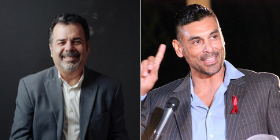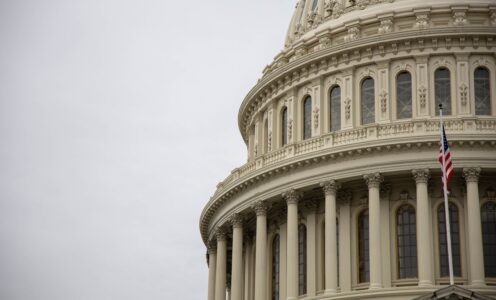Kindly keep these two men in mind.

They are Reverend Carlos Rincon of the Assemblies of God, a fundamentalist Christian denomination, and Eddie Martinez, executive director of Latino Equality Alliance, which advocates for the LGBT community.
You can bet Rincon and Martinez disagree about plenty.
Yet they set aside any differences during an October 28 event that the nonprofit Southeast LA Collaborative held at the AltaMed Medical and Dental Group facility on Atlantic Avenue in the working-class enclave of South Gate.
The two men joined SELA Collaborative Executive Director Wilma Franco and LA County Registrar-Recorder Dean Logan to encourage voters to exercise their rights and make their voices heard. There was a mobile polling station on hand-and no elected officials or signs of partisanship in sight.

Rincon was there as the chief executive officer of the Institut de Advance Latino (IDEAL) Community Development Corp., which perhaps allows him more room to take up worldly affairs in a practical manner compared with his role as a pastor for a socially conservative congregation. Martinez is a Roman Catholic who has struggled with his church’s positions on matters of sexuality since his youth, and more recently made a public expression of appreciation for Pope Francis‘ endorsement of civil unions for gay couples.
Neither Rincon nor Martinez came to the AltaMed facility to promote any individual agenda. They didn’t push any particular political candidate or ideology or religion or view of sexual orientation. They showed up to encourage service to community through voting-and they stuck to that job in their brief remarks to onlookers and media.
Different men, different organizations, different missions in life-yet they found a way to stand together on the common ground of democracy.
The concept of common ground is especially important at this moment because the 78 days between now and the inauguration of our next president on January 20 could be the most consequential period of American life since Watergate.
Seeds of division and disunity have been sown for years. We’ve been slipping toward this moment for decades. President Donald Trump might be more effective than most at exploiting differences, but this isn’t all on him. There’s plenty of blame for both major political parties, both ends of the political spectrum, and various enterprises that count on divisiveness for viewers, listeners, readers, clicks, “likes” and retweets.
* * *
Now is a good time to recall that our nation has been shook before, with largely forgotten eras of deep discord on both sides of the most obvious instance of the Civil War.
An early example came with the Whiskey Rebellion, an uprising against the first federal tax, which sought funds to pay off debts from the Revolutionary War. The farmers whose grains were main ingredients of whiskey stood against a tax on the product, threatening our country in its first years under George Washington himself.
Another came as we suffered through social vertigo induced by the Great Depression. The economic dislocations of that era saw numerous cases of everyday folks resisting foreclosures in the heartland. Many resorted to violence to face down sheriffs in charge of auctioning off properties.
Modernity brings complications to the American habit of occasional fits of violence against government authority.
Just imagine what might have happened if the farmers behind the Whiskey Rebellion-ancestors of Hillary Clinton‘s “deplorables”-had social media. What if cable TV had been around to cover folks who drew guns on sheriffs, and in one case beat a local judge?
Social media and the cable effect are in play now. And they extend the chain of responsibility for the next 78 days to each one of us as individuals.
Our age of hyper-communications holds much good-everything from warnings to homeowners in the paths of wildfires to data that allows farmers in developing markets to gauge a fair price for crops at market.
It also adds poisons borne of frustration and insouciance to our politics.
We should be prepared for the possibility that some extra measure of toxicity will be added to our national discord in the aftermath of this year’s election.
A recent New York Times/Siena College poll crystalized the challenge of this moment. It found that 49% of respondents felt they were personally better off today than four years ago.
The poll had a margin of error of +/- 3.4 percentage points. That means that close to half-and perhaps a majority-of voters reported feeling personally better off after four years of the Trump Administration.
The same poll asked respondents whether they felt our country is better off than it was four years ago.
Only 39% said that is the case.
That indicates-even considering the margin of error-that a clear majority of respondents think the country is worse off since 2016.
* * *
The poll calls to mind conflicting aspects of America.
History, again, offers some guidance.
We are a nation that argued among ourselves for more than three years as Europe boiled with the plain evil of Nazi aggression, and warlords ran roughshod over Asia. We maintained our famous sense of individualism in the form of isolationism as territory from China to Poland to France was conquered and Great Britain got pounded.
Plenty of Americans were personally better off than they had been in years at that point. The Great Depression had finally faded, thanks in part to foreign wars that were driving demand for all sorts of our material and products. Americans were generally content to sit out the fighting over there and tend to their newly prosperous lives over here.
Then we were attacked at Pearl Harbor, and individualism gave way to a sense of community and service. Americans by and large decided that it didn’t matter how they were doing personally if our country and democracy were directly threatened.
* * *
Some on both sides of this election will likely see an historic crossroads if their preferred candidate loses-both sides of the campaign have certainly painted pictures of a point of no return.
And, hyperbole aside, it does feel as though this time is different at a fundamental level. Today’s atmosphere carries basic questions: Will our spirit of individualism split us apart as a nation in the wake of a bitter election? Or will we retain the sort of larger sense of service to community that has ultimately defined American patriotism in our most pressing moments?
It would be helpful if the result of this presidential election is decisive, with the winner clear on election night.
That might not be the case, though. It might take weeks, perhaps with the courts involved.
Not everyone is going to get the outcome they want, in any case.
And it’s the folks who don’t get what they want out of this election-and this applies to either side-who will hold the key to America’s integrity over the next 78 days.
Please think this through-regardless of which side of the divide you stand upon.
Please think about what you say, or print, or post, or tweet between now and January 20.
We’ve been playing with fire for decades when it comes to the very fabric of our civic life.
This year reminds us that it’s not a game.
A handful of subscribers canceled after last week’s endorsement of Joe Biden.
It was not a large number in relative terms, but I value every reader, and each cancellation carries meaning.
I also acknowledge that a free press works both ways in a free market. Nobody is required to agree or like what I write-or to pay for my reporting and viewpoints.
I respect everyone’s right to their opinions, and I retain respect for many individuals I know who support President Trump.
With that in mind I pass along a couple of notes of additional interest on the cancellations:
- All of them came from the LA County side of the readership of this column-and that should turn stereotypes upside down for anyone with old-time views of what OC is all about.
- Not one of the subscribers who canceled noted that the endorsement of Biden was accompanied by a much lengthier critique of the Democrats’ performance as the dominant political party in California and LA.
- None of them expressed any concern about the column’s critique of the $7 billion bond measure that’s being pushed by the Los Angeles Unified School District amid the tumult of the national political picture and fog of the pandemic.
I realize that there is great passion for national politics.
I urge everyone to keep in mind that the politics and government of the State of California, local counties and cities, and other public agencies are just as important as the Red-Blue conflict that keeps professional partisans busy.


Thanks for the article, the mission of our church and non-profit is to serve our community. We can agree to disagree, and still work for the betterment of our communities.
Thank you for your kind words, Pastor, and for your work in the community.